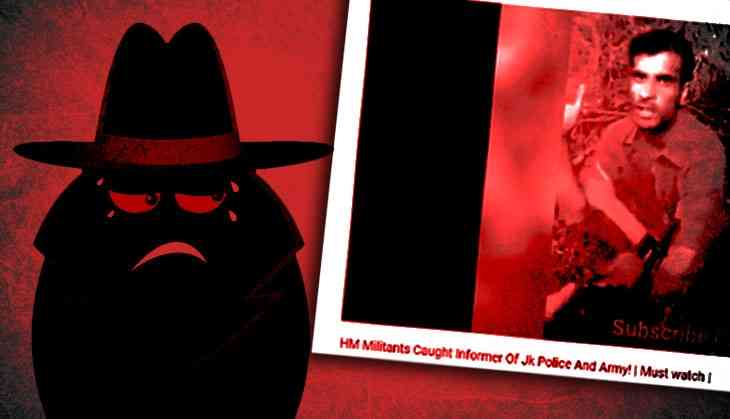Operation All Out halted: Some blame viral videos of informers, experts blame changed militant strategies

– What is your name?
– Ishtiyaq Ahmad Wagay.
– Who told you to act as an informant?
– I was told by Farooq who lives near bus adda and Saleem Mala. They told me if you don’t do this, they will shoot me.
– Who else works with you?
– There are two more informants. One is Sabir Ahmad Pandit and Ajaz Ahmaf Bhat.
– Who did you inform the police about?
– I informed on the two militants in Hussanpora and three others at Arwani.
– You mean you informed on Talha Sahab and Ibrahim Sahab at Hussanpora and Moosa bhai, Hamas alias Junaid Tantray and Turab at Arwani. And now you are chasing Dada (another militant)?
– Yes. But I was forced to do this.
Days later, Wagay’s bullet-riddled body was found sprawled on the roadside, clad in the same Khan dress he wore during the filmed interrogation by the militants, now splattered with blood. Police said they would investigate the killing.
The video of the interrogation was later uploaded on social media, apparently by the militants themselves as a justification for the killing and it soon went viral.
There is another video too. The terrified youngster in the video also admits having got a militant killed and the two stone throwers arrested. He claims to have received Rs 10,000 for this information. It is not known what happened to him.
Other people named by the alleged informers are now on the run.
Have the militants broken the intelligence network set up by security agencies over a long period of time and which had allegedly helped accelerate the killings of the militants over the three months beginning June?
About 60 militants were killed, 30 of them in June only, in an anti-militancy drive called Operation All Out. But the number of the killings have drastically come down in September. Around 16 militants lost their lives in different encounters in the month.
Is this the result of the diminished information flow due to the outing of the alleged informers?
It seems like a logical explanation for the existing turn of events. But security experts in the state don’t think so. According to them, it is not necessary that the people killed for being alleged informers were necessarily involved in the activity.
“First these persons are shown accepting their role under duress, with a gun pointing at them. So confession cannot be held to be authentic,” said an officer.
At the same time, security experts don’t believe that killing “mukhbirs” stops the flow of information.
“Everything from harbouring a militant, escorting and guiding him to apprehending and killing him is a profession and a part of the game. Hundreds of houses have been burnt in encounters, does that stop people from giving shelter to militants? Hundreds of militants have been eliminated, OGWs have been captured and booked under PSAs, modules have been busted but does that stop more youth from joining the jihad?” asked a police officer.
“Same for the intelligence. Killing of some alleged informers may be a setback but it doesn’t stop the flow of information. It goes on. You will always find people on both sides ready to work, some for money, some for sentiment and ideology. This has become a part of life in the state,” he added.
On the other hand, the top security functionaries like Director General of Police are inclined to trace the decline in militant killings to the change in militant tactics.
“In a situation like this, everyone changes their tactics. We will also change, do not worry,” he told media adding the security agencies will nevertheless press ahead with the ‘Operation All-Out’.
The Inspector General of Police Muneer Khan, on the other hand, said that following the recent frequency in the killings of militants, the remaining have “either damaged or surrendered” their mobile phones.
“We have information that after the killing of top militants over the past few months, a majority of Hizbul Mujahideen and Lashkar-e-Taiba militants have gone into hiding in the upper reaches. They have also stopped moving around in residential areas. But we will work out a strategy to get them,” Muneer Khan told reporters on the sidelines of a recent cleanliness drive launched by J&K police at Police Control Room here.
Incidentally, the instruction to militants to not use mobile phones or social media had come from across the border. A statement issued by Hizbul Mujahideen from PoK advised its cadre to give up cellphones as it helped the electronic surveillance of their presence by the security forces.
But human intelligence, security experts admit, still forms the major chunk of the intelligence gathering about the militants. Hence the outing of some alleged informers can temporarily set back the efforts to track down the militants. And this is what appears to be the case now.
Operation All Out has been stopped in its tracks. And it will, as DGP Vaid has said, be set into action once again when security forces re-adjust their strategies.
Meanwhile, the number of the militants killed this year has gone up to 161, the highest in the past seven years. In 2016, 146 militants were killed in 97 encounters. As against 300 in the beginning of the year, the number of the militants in Valley is estimated to have reduced to around 200.
“Our effort will be to reduce it further either through surrenders or more killings. And on their part, militants have changed their survival strategy. It is a matter of who gets on top of whom in a given a period of time. The game will go on,” said a security official active in the counter-insurgency operations.
Edited by Jhinuk Sen

